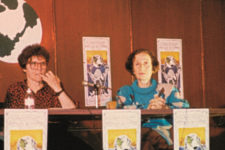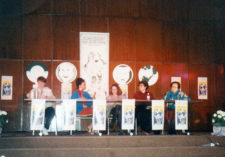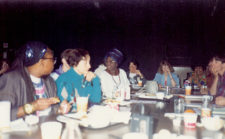In 1988 in Buffalo, New York, the First International Women Playwrights Conference was held, where over two hundred playwrights attended from 30 countries around the world. M.L.P. represented Greece and presented her play "The Glass Box" at the University of Buffalo Theater. Shortly before the end of the conference, M.L.P. asked the committee to intervene by commenting on the events. The overall theme she presented was related to censorship and female drama. Her speech resonated with the audience and her handwritten text, copied, was distributed to the attendees. Later, the New York Times, which covered the event, reported on M.L.P.'s intervention and published part of her speech in the article.
The following is an excerpt from the intervention:
I am Greek. I come from a country that is not measured by the few acres of its land, but by the three thousand years of its spiritual culture. So I'm coming from a great country.
I believe that: To create is to go against.
I know the censorship imposed by a regime. When there was a dictatorship in Greece, I wrote a play against it because a friend was captured and tortured. The censor characterized the play as "anarchistic" and "dangerous", trying to prevent its production. I say this to explain that I know, I have personal experience of this kind of censorship. But here I want to speak about self-censorship. I believe that my censorship is my fear as a human being, existential fear, substantial fear, and that is more important for me than my social, political and familial relationship fear. That means: as a playwright, I am free in a dictatorship but I am not free from my personal fears.
Well, creation is a way to go against my metaphysical fears, against my innocence, against my need to compromise, against the times, against my culpability.
Creation is "to go against" in order to transcend. I believe ths describes my self-censorship, how to tell my truth. But to be able to tell my truth, I must find my truth, and this truth is the liberation of my face (prosopo). Prosopo is a Greek word meaning spiritual individuality. And that is the last against: against my self-censorship. In this distinguished conference, I hear about the problems of each speaker, problems of their country, of personal life or social, sexual and color problems. I understand that the problem describes the difficulty of being playwright. I respect these problems, but it's not enough. I don't hear about women's dramatic creation as an existential necessity. I don't hear about the stuff of her plays, stuff of her dreams, of her internal need to be a playwright in this troubled world.
I believe that women's nature is nearer to world mystery because she has been created to be a mother, and that, I believe brings her closer to contemporary problems. There is a mysticism and an inborn sensibility in her that enables her to conceive the great questions of life, of dream, of death, of god, of peace. The playwright belongs to her time more than to her country. A woman is the same beyond color or country or society. I am a human being in my loneliness and my nakedness in front of my own destiny, which is the same for every human being in the world. If the theatre as action and passion and drama helps me to find my human limits, it gives me also the dream and the possibility to transcend my limits. I would like to hear about the woman playwright's position vis-a-vis the contemporary problems, beyond her local and personal problems.
The above text has been published in the volume of proceedings of the "International Women Playwrights Conference".
Link to the New York Times archive that features the article.
"At a general session Thursday afternoon, Maria Lambadaridou - Pothou of Athens said: "I hear about the problems of each speaker, problems of their country or of their personal life, or social or sexual or color problems, and I understand that the problem describes the difficulty of being a playwright. I don't hear about women's dramatic creativity as an existential necessity. I don't hear about the stuff of her plays. the stuff of her dreams, of her internal need to be a playwright in this troubled world,"


